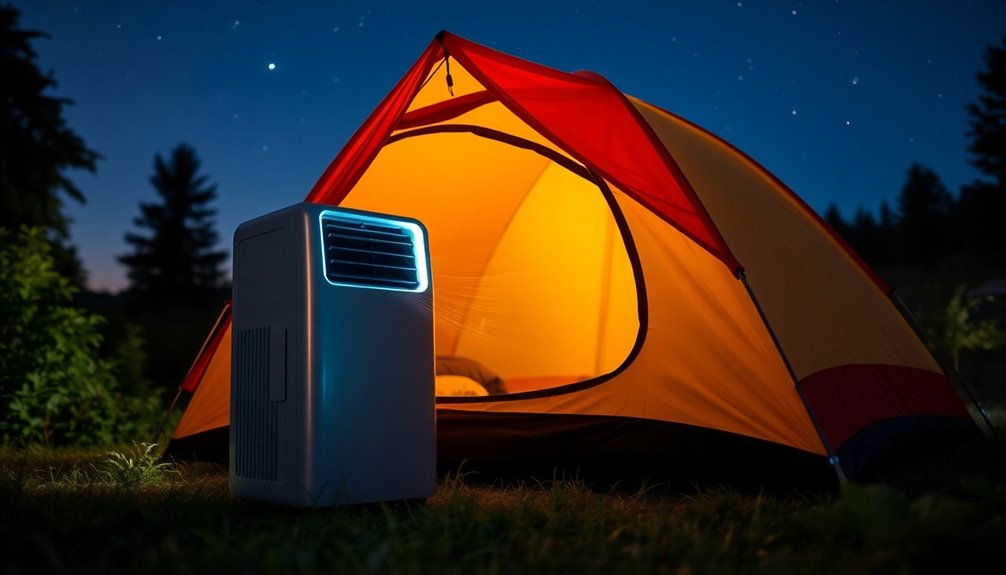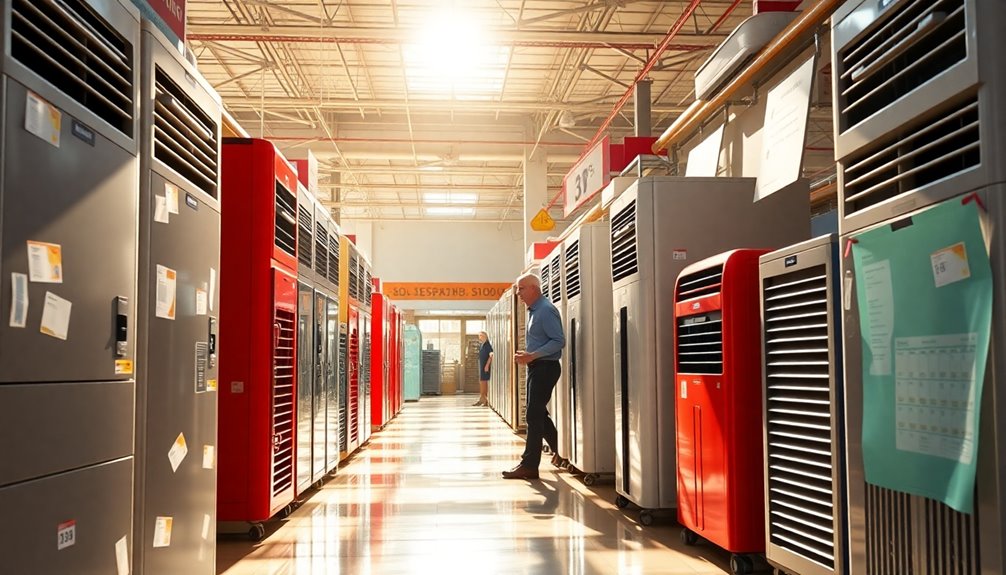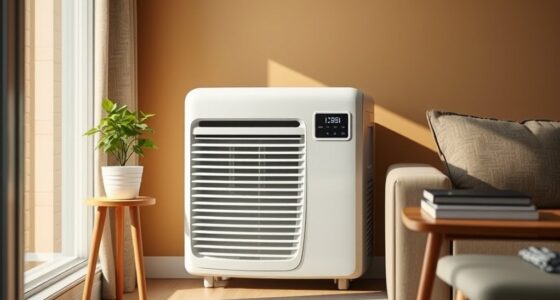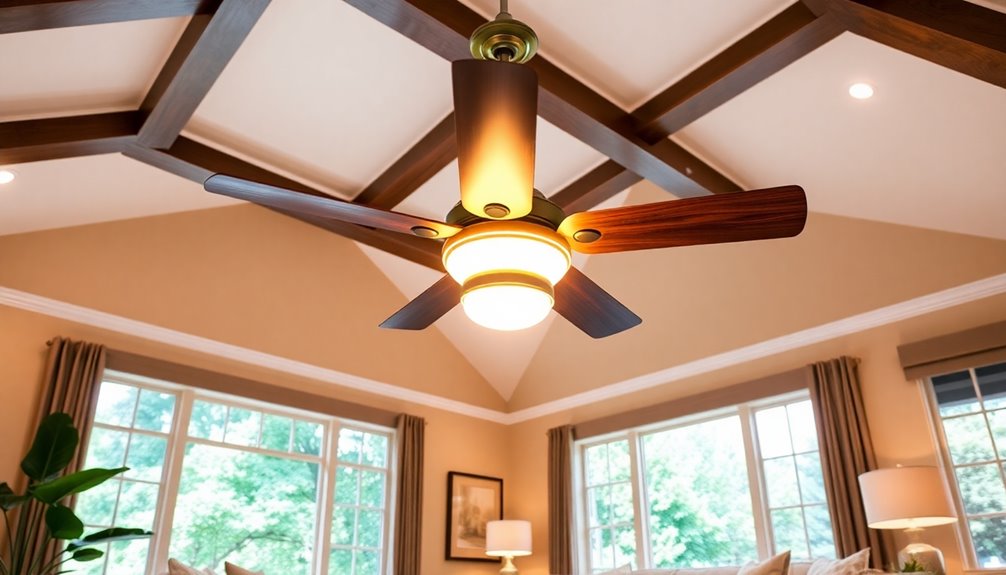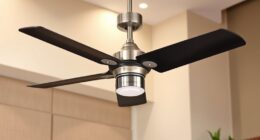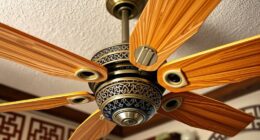When I'm out camping, staying cool in my tent is a must, and I've found the 15 best portable air conditioners to help with that. Options like the BLACK+DECKER 8,000 BTU unit cool spaces up to 350 sq. ft., while the Evapolar evaCHILL drops temps by 10 degrees without much power. If I'm looking for something compact, the 1,500 BTU models are perfect for smaller tents. Most are lightweight and easy to set up. From convenience to energy efficiency, there's a lot to contemplate to maximize comfort outdoors. Keep exploring, and you'll find the best fit for your needs! Additionally, many of these units come with features like adjustable fan speeds, built-in timers, and remote controls, making them even more convenient for outdoor adventures. Whether you’re tackling scorching summer days or humid nights, finding the best portable AC for camping can make all the difference in ensuring a restful trip. With options catering to different budgets and cooling capacities, there’s something out there for every camper’s needs. Plus, innovative advancements in design mean the best tent air conditioners 2025 are becoming even more eco-friendly and compact, perfect for modern campers. Some newer models are solar-powered, making them ideal for sustainability-focused adventurers who want to keep their carbon footprint low. With so many versatile options available, staying cool while camping has never been easier or more efficient!
Key Takeaways
- Look for portable AC units with cooling capacities between 1,500 to 5,200 BTUs for effective temperature control in tents.
- Choose lightweight models (20-30 lbs) with built-in handles for easy transport and setup during camping trips.
- Consider units with USB power options or 12V DC compatibility for convenient operation using car batteries or portable power stations.
- Ensure the AC has low noise levels (below 52 dB) for a comfortable sleeping environment in your tent.
- Prioritize models with dehumidification functions to manage moisture and enhance overall comfort in humid conditions.
BLACK+DECKER 8,000 BTU Portable Air Conditioner with Remote Control
If you're camping during a heatwave and need a reliable way to keep your tent cool, the BLACK+DECKER 8,000 BTU Portable Air Conditioner with Remote Control is an excellent choice. It effectively cools spaces up to 350 sq. ft., making it perfect for my tent. With its 3-in-1 functionality—air conditioning, dehumidifying, and fan modes—it adapts to my needs. The remote control and top-mounted LED display make adjustments simple, even when I'm lounging outside. I appreciate how energy-efficient it is, cycling on and off to save on electric bills. Just remember to maintain the unit by cleaning the filter regularly. Overall, it's a fantastic investment for staying comfortable in the great outdoors during those scorching summer days.
Best For: Individuals seeking a portable and efficient air conditioning solution for small to medium-sized spaces, such as tents or rooms up to 350 sq. ft.
Pros:
- Energy-efficient operation that helps lower electric bills.
- Versatile 3-in-1 functionality, providing cooling, dehumidifying, and fan options.
- Easy mobility with casters and handles for transport between locations.
Cons:
- Requires regular maintenance, including filter cleaning and water drainage.
- Some users report fit issues with the standard window kit for venting.
- Noise level may be a concern for sensitive users, especially during operation.
Evapolar evaCHILL Portable Air Conditioner
The Evapolar evaCHILL Portable Air Conditioner stands out as a perfect solution for those seeking personal cooling in confined spaces like tents. This compact device utilizes evaporative technology to cool and humidify the air, effectively lowering temperatures by 5-10 degrees within a 3-5 foot radius. With just 10W of power, it's energy-efficient and can easily be powered via USB from a power bank or laptop. I appreciate the four adjustable fan speeds, although higher settings can get a bit noisy. The water tank lasts 5-7 hours, but it does need refilling every couple of hours. While it's not ideal for humid environments or entire rooms, it's a solid choice for localized comfort during outdoor adventures.
Best For: Individuals seeking localized cooling solutions in small spaces such as desks, cars, or tents.
Pros:
- Energy-efficient with only 10W power consumption, easily powered via USB.
- Compact and portable, ideal for use in outdoor activities or confined spaces.
- Adjustable fan settings allow for personalized comfort.
Cons:
- Limited cooling range, effective only within 3-5 feet and not suitable for large areas.
- Requires frequent water refills, with a tank lasting only 5-7 hours on high settings.
- Potential durability issues, including concerns about leakage and electrical safety over time.
BLACK+DECKER 3-in-1 Personal Portable Air Conditioner
Looking for a compact solution to beat the heat while camping? The BLACK+DECKER 3-in-1 Personal Portable Air Conditioner might just be what you need. With its 1000 BTU cooling capacity, this unit is perfect for personal space, offering two cooling speeds and three fan settings. Measuring just 8.23 x 9.84 x 18.98 inches and weighing 28.6 pounds, it's easy to move around and requires no window installation. I appreciate the electronic control panel and timer, which add convenience. However, keep in mind that it can be a bit noisy at 48 dB, especially at night. Overall, if you're looking for effective cooling in small spaces, this portable air conditioner is a solid choice.
Best For: Those seeking a compact and portable cooling solution for personal spaces, such as small rooms or camping setups.
Pros:
- Effective cooling for personal spaces with a 1000 BTU capacity.
- Easy to transport due to its lightweight design and casters.
- User-friendly electronic control panel with a timer feature.
Cons:
- Can be noisy at 48 dB, potentially disrupting sleep.
- Limited cooling capacity, not suitable for large rooms.
- Inconsistent remote functionality reported by some users.
Portable Air Conditioner for Tent (1,500 BTU)
For campers seeking relief from sweltering heat, the Portable Air Conditioner for Tent (1,500 BTU) stands out as an ideal solution. This compact unit cools spaces up to 50 sq. ft., making it perfect for my tent. With a cooling capacity of 1,500 BTU and an air circulation rate of 140m³/h, it effectively combats high temperatures. I appreciate its lightweight design and single-hand handle for easy transport. However, I found it works best when set up properly, with the exhaust vent outside the tent. While some users noted minor cooling issues in larger tents, I've enjoyed its multi-functional modes. Just keep an eye on condensation drainage; I've had to create makeshift solutions for that!
Best For: Campers looking for a portable cooling solution in small tents or confined spaces.
Pros:
- Lightweight and compact design for easy transport.
- Multi-functional with both cooling and fan modes.
- Effective cooling for small areas when set up correctly.
Cons:
- May struggle to cool larger tents effectively.
- Condensation drainage issues reported by users.
- Higher price point compared to similar products.
Camping Portable Air Conditioner (2000BTU Fast Cooling)
Camping in hot weather can be unbearable, but this 2000BTU portable air conditioner is a game changer for those who cherish outdoor adventures. Weighing just 11.5 pounds, it's compact and easy to carry, fitting comfortably in my 1-3 person tent. With six adjustable wind speed modes, it quickly cools the space while maintaining low power consumption—only 100-200 watts! I love the remote control feature, making it effortless to adjust settings from my sleeping bag. Plus, the 1.2L water storage tank keeps it running for up to 18 hours in low humidity. Just remember to position the hot air vent outside when indoors! For a comfortable camping experience, this AC unit is definitely worth considering.
Best For: Outdoor enthusiasts and campers looking for a lightweight and efficient cooling solution for their tents during hot weather.
Pros:
- Low power consumption (100-200 watts) makes it energy-efficient for extended use.
- Long operational time of up to 18 hours in low humidity due to the 1.2L water storage tank.
- Remote control functionality allows for easy adjustments without leaving your sleeping bag.
Cons:
- May not cool effectively in direct sunlight; best used in shaded areas or at night.
- Requires positioning the hot air vent outside when used indoors, which may limit indoor usage options.
- Cooling capacity is primarily suited for smaller spaces (1-3 person tents), limiting its versatility for larger areas.
Portable Air Conditioner for Camping
When heat waves hit during outdoor adventures, the Just-V Portable Air Conditioner stands out as an ideal solution for campers who crave comfort without the hassle of complex setups. With a cooling capacity of 5200 BTUs, it efficiently cools spaces up to 60 square feet, making it perfect for tents and RVs. Weighing only 52 pounds, its compact design allows me to carry it easily with one hand. I love that it operates quietly at less than 50 dB, ensuring a peaceful night's sleep. Plus, the versatile modes—cooling, fan, and heating—make it useful year-round. Its low energy consumption and environmentally friendly refrigerant are just icing on the cake. With the Just-V, camping comfort is a breeze!
Best For: Campers and outdoor enthusiasts who want a portable, efficient cooling solution for small spaces.
Pros:
- Low noise level at ≤50 dB, ensuring a quiet environment for sleeping.
- Versatile modes for cooling, fan, and heating, suitable for year-round use.
- Compact and lightweight design allows for easy transport and one-handed operation.
Cons:
- Limited cooling capacity for larger spaces beyond 60 square feet.
- Requires a power source, which may not be available in all camping locations.
- Some users may need a longer flexible hose for optimal airflow.
Portable Air Conditioner for Outdoor and Home Use
Imagine enjoying the great outdoors without sweating through your gear. The EnjoyCool link2AC portable air conditioner is perfect for both outdoor adventures and home use. It's compact, weighing just 14.3 lbs, and easy to carry with its ergonomic handle. With a cooling capacity of 2380 BTU, it effectively cools spaces up to 43 sq. ft., making it ideal for tents, RVs, or even your living room during a heatwave. I love its four operating modes, especially the quiet sleep mode that runs at just 43 dB. Plus, the adjustable air vent lets me customize the cooling direction. With a one-year warranty and a 30-day return policy, it's a reliable choice for staying cool wherever I am.
Best For: Those seeking a portable air conditioning solution for outdoor activities, camping, or small indoor spaces during hot weather.
Pros:
- Lightweight and portable design with an ergonomic handle for easy transportation.
- Multiple operating modes including a quiet sleep mode at 43 dB for comfortable nighttime use.
- Adjustable air vent direction allows for customized cooling in various settings.
Cons:
- Limited cooling capacity of 2380 BTU, suitable for small areas only.
- Requires power source, which may limit outdoor use unless near an outlet or generator.
- Customer rating of 4.0 out of 5 stars, indicating some room for improvement based on user feedback.
EF ECOFLOW Wave 2 Portable Air Conditioner
If you're seeking a powerful yet portable solution for staying cool in your tent, the EF ECOFLOW Wave 2 Portable Air Conditioner stands out with its impressive 5100 BTU cooling capacity. This unit not only cools but also heats, offering 6100 BTU when needed. I love how it can adjust the temperature by 18℉ in just five minutes, making it perfect for quick relief. Weighing only 32 lbs, it's lighter than its predecessor, enhancing portability. Plus, it's versatile with multiple charging options—AC, solar, or even from your car. The quiet operation at 44 dB guarantees a peaceful night's sleep, and the eco mode extends battery life for up to eight hours. It's truly a game-changer for outdoor comfort!
Best For: The EF ECOFLOW Wave 2 Portable Air Conditioner is best for outdoor enthusiasts and RV travelers seeking a compact and efficient cooling and heating solution.
Pros:
- Powerful Cooling and Heating: Offers 5100 BTU cooling and 6100 BTU heating capacities.
- Quick Temperature Adjustment: Changes temperature by 18℉ in just five minutes.
- Multiple Charging Options: Can be powered by AC, solar, car, or power stations for versatile use.
Cons:
- Drainage Requirement: Needs drainage in high humidity conditions, which can be inconvenient.
- Weight: Although lighter than its predecessor, it may still be considered heavy for some users.
- Limited Battery Life in High Usage: While eco mode extends battery life, heavy use may require frequent recharging.
EF ECOFLOW Wave 2 Portable Air Conditioner
The EF ECOFLOW Wave 2 Portable Air Conditioner is an excellent choice for campers and outdoor enthusiasts seeking reliable cooling and heating in their tents. With a cooling capacity of 5100 BTU and heating at 6100 BTU, it quickly adjusts temperatures by 18℉ in just five minutes. I love that it offers four charging options—AC, solar, car, and power stations. Its swappable battery can last up to eight hours in Eco Mode, making it perfect for long trips. However, while it operates quietly at 44 dB, I've found that it struggles to heat effectively in colder conditions. The unit's compact design is handy, but I wish it were more durable for transport. Overall, it's a solid investment for comfort outdoors.
Best For: The EF ECOFLOW Wave 2 Portable Air Conditioner is best for campers and outdoor enthusiasts who need reliable and efficient cooling and heating while on the go.
Pros:
- Quick temperature adjustment: Achieves a temperature drop/rise of 18℉ in just five minutes.
- Multiple charging options: Can be powered via AC, solar, car, or power stations for versatility.
- Quiet operation: Runs at a low noise level of 44 dB in Sleep Mode, making it suitable for nighttime use.
Cons:
- Ineffective heating in cold conditions: Struggles to provide adequate warmth in temperatures below 40F.
- Bulky and fragile design: Users report that the unit is heavy and requires careful handling during transport.
- Battery charging issues: Some users experienced energy loss and a notable 20-watt energy leak.
EnjoyCool Portable Air Conditioner for Camping
For campers seeking a reliable way to beat the heat, the EnjoyCool Portable Air Conditioner stands out with its impressive 2380 BTU cooling capacity. Weighing only 6.5 kg, it's lightweight and easy to transport, making it perfect for my camping trips. With a rapid cooling capability, it can drop temperatures by 30-40°F within just 10 minutes. I appreciate the dual hose system for quick setup, and the noise level is pleasantly low, ensuring I can sleep undisturbed. Plus, with four cooling modes and a remote control, I can customize my comfort easily. While it's best for smaller spaces, it's been a game-changer for keeping me cool during outdoor adventures. Just be prepared—it may not cool entire tents or trailers effectively.
Best For: Campers and outdoor enthusiasts looking for an efficient and portable cooling solution for small spaces.
Pros:
- Lightweight and portable design makes it easy to transport and set up at camping sites.
- Rapid cooling capability can drop temperatures by 30-40°F in just 10 minutes, providing quick relief from the heat.
- Multiple cooling modes and remote control allow for customizable comfort based on individual preferences.
Cons:
- Limited effectiveness in large areas, making it unsuitable for cooling entire tents or trailers.
- Potential issues with ambient sensor error codes reported by some users.
- Best suited for small spaces, which may not meet the needs of larger groups or setups.
Portable Air Conditioner (5100BTU, AC ONLY)
Looking to keep your tent cool during those sweltering summer nights? The Portable Air Conditioner (5100 BTU, AC ONLY) might be just what you need. Weighing only 30.9 lbs and featuring an ergonomic carrying handle, it's easy to transport to your campsite. With a cooling range from 61°F to 90°F, it effectively cools spaces up to 160 square feet. I appreciate its multiple modes, including Cool, Dry, Sleep, and Fan, allowing me to tailor the experience. However, some users mention mixed results in efficiency, especially in enclosed areas like tents. Still, with a quiet operation below 42dB and a 24-hour timer, it's a solid option for keeping cool while enjoying the great outdoors.
Best For: Those seeking a portable and efficient cooling solution for small spaces like tents, RVs, or camping sites.
Pros:
- Lightweight and portable design makes it easy to transport and set up anywhere.
- Multiple cooling modes provide flexibility for different environments and preferences.
- Quiet operation below 42dB ensures a peaceful night's sleep.
Cons:
- Mixed reviews on cooling efficiency in enclosed spaces may lead to disappointment in very hot conditions.
- Limited documentation for maintenance tasks like filter removal can be frustrating for users.
- Potential issues with product delivery have been reported by some customers.
Portable Air Conditioner for Tent (1,500 BTU)
If you're camping in a tent and need a reliable cooling solution, the 1,500 BTU portable air conditioner is an excellent choice. With its powerful cooling capacity, it can rapidly chill spaces up to 50 square feet, making those hot nights more bearable. Weighing just 20 pounds and featuring a compact design, it's super easy to transport using the built-in handle. I love that it offers both cooling and fan modes, plus it operates quietly at noise levels under 52dB(A). The eco-friendly R134A refrigerant keeps energy consumption low, and it's compatible with household outlets and portable power stations. With included hoses and a remote control, setting it up is a breeze. Plus, you get a 1-year warranty for peace of mind!
Best For: Campers and outdoor enthusiasts seeking a portable and efficient cooling solution for small spaces like tents and vehicles.
Pros:
- Powerful cooling capacity of 1,500 BTU effectively chills areas up to 50 sq.ft.
- Compact and lightweight design makes it easy to transport and set up.
- Eco-friendly refrigerant and energy-efficient operation help reduce environmental impact.
Cons:
- Limited cooling area may not suffice for larger tents or spaces.
- Requires access to power, which may not always be available in remote camping locations.
- Customer rating based on a single review may not fully represent performance.
Portable Mini Air Conditioner with 3-Speed and Touch Screen
The Portable Mini Air Conditioner with 3-Speed and Touch Screen stands out as the perfect solution for anyone seeking a cool retreat while camping or enjoying outdoor activities. This compact unit, only 6.4 inches tall, is incredibly easy to transport and fits seamlessly in a tent, RV, or even your car. With its 3-in-1 functionality, it serves as a fan, air conditioner, and evaporative humidifier, providing a comfortable breeze wherever I go. I appreciate the adjustable speed settings and the LED touch display, which makes operation a breeze. Plus, it's energy-efficient and operates quietly, promoting a peaceful environment. I love that it's USB powered, ensuring I can keep cool without relying on a bulky power source.
Best For: Individuals seeking a portable and efficient cooling solution for camping, outdoor activities, or small spaces.
Pros:
- Energy-efficient design that saves on power while providing cooling relief.
- Compact size makes it easy to transport and suitable for various environments.
- Multi-functional as it combines a fan, air conditioner, and humidifier in one unit.
Cons:
- Limited cooling capacity compared to larger, traditional air conditioning units.
- Requires access to USB power sources, which may not always be available outdoors.
- Relatively small water tank may need frequent refilling for optimal humidification.
Portable Air Conditioner for Camping and Outdoor Use
When you're out camping or enjoying the great outdoors, having a reliable portable air conditioner can make all the difference in your comfort. I love how quickly this unit cools my space by 18℉ in just five minutes, thanks to its powerful 3300TU cooling mode. With a weight of only 21.6 lbs, it's super easy to transport, and I appreciate the flexible power supply options—AC, DC battery, or even solar panels. The 5-in-1 functionality, including WiFi control and ultra-quiet sleep mode, makes it versatile for any situation. Plus, the no-drain feature saves energy and hassle, giving me peace of mind as I enjoy my outdoor adventures without breaking a sweat.
Best For: Campers and outdoor enthusiasts looking for an efficient and portable cooling solution.
Pros:
- Highly portable at only 21.6 lbs, making it easy to carry on camping trips.
- Versatile power supply options allow for use with AC power, DC battery, solar panels, and car chargers.
- Quiet operation with a 38 dB sleep mode ensures comfortable cooling without disturbing the peace.
Cons:
- Limited cooling capacity may not suffice for larger spaces or extreme heat conditions.
- Additional cost for optional remote control can be a drawback for some users.
- Requires a power source which may not be available in all remote camping locations.
Portable Air Conditioner (5100BTU, 600W)
Looking for a portable air conditioner that's lightweight yet powerful enough to keep your tent cool during those hot summer nights? The Portable Air Conditioner with 5100 BTU cooling capacity and 600W power consumption is a fantastic choice. It measures just 19.68×10.82×12 inches and weighs 30.9 lbs, making it easy to transport with its ergonomic carrying handle. This unit effectively cools spaces up to 160 square feet and operates between 61°F and 90°F. With features like a 24-hour preset timer, sleep mode with noise levels below 42dB, and a dehumidifying function, it guarantees comfort during your outdoor adventures. Plus, the Bluetooth remote control lets you adjust settings from up to 32 feet away. Enjoy your camping experience in comfort!
Best For: Those seeking a lightweight and efficient cooling solution for small spaces, such as tents, RVs, or camping setups.
Pros:
- Compact and portable design makes it easy to transport and set up anywhere.
- Quiet operation with noise levels below 42dB, ensuring a peaceful environment while sleeping.
- Versatile cooling modes including Cool, Dry, Sleep, and Fan, along with a dehumidifying function for added comfort.
Cons:
- Limited cooling capacity may not effectively cool larger spaces beyond 160 square feet.
- User feedback indicates concerns about cooling efficiency in extremely hot conditions.
- Requires idle time before restarting to prevent compressor damage, which may be inconvenient.
Factors to Consider When Choosing a Portable Air Conditioner for a Tent

When I'm choosing a portable air conditioner for my tent, I consider several key factors. The cooling capacity needs to match the size of my tent, while the power source must be convenient for my setup. I also think about noise levels, portability, and how easy it is to install, so I can enjoy my camping experience without hassle.
Cooling Capacity Requirements
Choosing the right cooling capacity for a portable air conditioner can make all the difference in your tent's comfort. When I'm selecting one, I always look at the cooling capacity measured in BTUs (British Thermal Units). For tents up to 50 square feet, a unit with around 1,500 BTUs usually does the trick. If you've got a larger tent, though, you might need something beefier, with ratings from 2,000 to 5,200 BTUs to keep things cool during those hot summer nights.
I also pay close attention to how quickly the unit can cool the air. Ideally, I want it to drop the temperature by 5-10 degrees Fahrenheit within about 20 minutes. The surrounding conditions matter too; air conditioners function best in low-humidity environments. If humidity levels soar above 70%, the unit might struggle, so I factor that in when choosing.
Lastly, I verify the portable air conditioner has proper ventilation options. A well-designed exhaust system is essential for expelling hot air outside while keeping the inside nice and cool. Taking these factors into account really helps me enjoy a comfortable camping experience.
Power Source Options
After confirming the cooling capacity meets my tent's needs, I turn my attention to power source options. When choosing a portable air conditioner for camping, I find it's vital to think about how I'll power the unit. Many models come with diverse power sources, like standard AC outlets, 12V DC for car batteries, and compatibility with portable power stations or solar panels. This versatility allows me to adapt to whatever power supply is available at my campsite.
I also pay attention to the power consumption of the units, which typically ranges from 100 to 600 watts. This low energy use is ideal for maximizing efficiency while camping. Some units even feature built-in batteries, offering extended cooling for 7 to 14 hours, which can be a lifesaver during a hot night.
To guarantee peak performance, I make sure the air conditioner matches the power supply at my camping site. This helps prevent overloading circuits. Finally, I prefer models with dual power options since they provide flexibility for both home use and outdoor adventures, making my camping experience much more enjoyable.
Noise Level Considerations
Taking noise levels into account is vital for a pleasant camping experience when selecting a portable air conditioner for my tent. The noise output of these units can vary quite a bit, typically ranging from 43 dB to 52 dB. I've learned that quieter models are definitely better suited for nighttime use, allowing me to sleep peacefully without disruptive sounds.
If I choose a unit with a sleep mode, it can drop the noise level to below 42 dB, which is fantastic for maintaining a serene environment. However, I need to keep in mind that higher fan settings can produce noise similar to a PC fan, which can be quite annoying in the close quarters of a tent.
It's important to evaluate the noise ratings of the portable air conditioners, especially since I'll be using them in limited spaces or shared areas. Some models are explicitly designed to operate quietly, making them ideal for my tent setup. By prioritizing noise levels, I can guarantee my camping trips remain comfortable and relaxing, allowing me to fully enjoy the great outdoors without the distraction of excessive noise.
Portability and Weight
When I'm out camping, I often prioritize portability and weight in my selection of a portable air conditioner for my tent. I've noticed that these units can vary greatly, with some lightweight models tipping the scales at around 11.5 lbs, while others can exceed 52 lbs. This weight difference really impacts how easily I can transport and set them up.
I also seek out compact designs that make handling straightforward. Models with built-in ergonomic handles are a game changer for me, allowing for convenient movement. Additionally, I always check the unit's dimensions; smaller units fit snugly in tight spaces, while larger ones might need extra room for proper ventilation.
Portability is further enhanced by air conditioners offering multiple power options. I appreciate those that can plug into standard household outlets or connect to portable power stations, giving me flexibility while camping. Features like single-hand handles and lightweight construction make a big difference too, especially in outdoor settings where mobility is essential. By considering these factors, I can guarantee my camping experience remains comfortable and hassle-free.
Installation Ease
Finding the right portable air conditioner for my tent isn't just about portability and weight; installation ease is just as important. I want a unit that I can set up quickly, without needing a toolbox or hours of fiddling around. That's why I look for models with a simple installation process, ideally requiring minimal tools.
I also prefer air conditioners that feature a dual hose or flexible duct system, as they improve ventilation while reducing the need for complicated modifications to my tent. Compact and lightweight units are a must too, especially since space can be tight when I'm out camping.
Another big plus is finding a model that doesn't require window installation. This is a game-changer for tent use, where those standard kits just won't work. Finally, I always check that the selected model comes with clear instructions and all necessary components, like hoses and fittings. Having everything included helps avoid delays and confusion when I'm enthusiastic to cool down after a long day outdoors. Choosing the right portable air conditioner means I can enjoy my camping experience without the hassle of complicated setups.
Humidity Management Features
Humidity can be a real challenge in a tent, especially during hot summer nights. I've learned that when choosing a portable air conditioner, effective humidity management features are vital. Many units come equipped with a dehumidification function, which helps control moisture levels in those small, enclosed spaces. It's worth noting that most models perform best when humidity stays below 70%, as higher levels can reduce cooling efficiency and lead to condensation issues.
I also appreciate units with a no-drain function for days when humidity is low. This feature conserves energy and simplifies operation, eliminating the hassle of manual water drainage. However, I can't stress enough the importance of effective ventilation. Proper setup, with the exhaust vented outside the tent and the intake inside, is essential for maintaining airflow and managing humidity.
Lastly, I make it a point to regularly clean or replace filters. In humid environments, neglecting this can lead to mold growth, which nobody wants to deal with. By considering these humidity management features, I guarantee a more comfortable camping experience, even when the weather doesn't cooperate.
Maintenance and Durability
Choosing a portable air conditioner for my tent means considering both maintenance and durability to guarantee a hassle-free experience. Regular upkeep is essential; I need to clean or replace filters every 3-4 months and drain condensation based on humidity levels. If I overlook this, I may face performance issues that ruin my outdoor adventure.
Durability matters, too. Portable models are often moved around, so I look for robust construction and sturdy handles. This way, I can transport my unit without worry. I also pay attention to the drainage design. Some models require elevation for effective drainage; neglecting this can lead to water damage and affect performance.
Noise levels are another consideration. I prefer units that operate quietly, especially since I want to enjoy peaceful nights under the stars. A loud air conditioner can disrupt sleep and spoil my experience. Finally, I check the warranty and customer support options. Investing in a reliable model with strong support can enhance its lifespan and give me peace of mind. By focusing on maintenance and durability, I can enjoy a comfortable camping experience without unnecessary hassle.
Frequently Asked Questions
How Much Power Do Portable Air Conditioners Consume While Camping?
When I camp, I always check how much power my portable air conditioner consumes. Typically, these units use between 500 to 1,500 watts, depending on their size and efficiency. I've found that smaller models are more energy-efficient, which is great for my generator or battery setup. It's essential to take into account both the cooling power and energy consumption so I can enjoy my trip without worrying about running out of power.
Can Portable Air Conditioners Be Used Inside a Vehicle?
I often wonder if portable air conditioners can be used inside a vehicle, and the answer is yes, but with some considerations. They can help cool down your car during hot days, but you need to guarantee your vehicle's power system can handle it. I've found that using a generator or a power inverter works best. Just keep in mind the space limitations and ventilation to avoid any safety issues.
Are Portable Air Conditioners Noisy During Operation?
Did you know that some portable air conditioners can operate at noise levels as low as 50 decibels, which is about the same as a quiet library? I've found that while many portable units can be a bit noisy, especially on high settings, there are quieter options available. If noise is a concern for you, look for models specifically designed for low noise operation. It really makes a difference during those hot summer nights!
What Is the Average Cooling Time for Portable Air Conditioners?
When I think about the average cooling time for portable air conditioners, I usually find it ranges from 15 to 30 minutes. I've noticed that factors like the size of the space and the unit's BTU rating can really influence how quickly it cools down a room. If I set it up properly, I can enjoy a comfortable environment in no time. Just remember to give it a little time to work its magic!
How Do I Maintain My Portable Air Conditioner While Camping?
Maintaining my portable air conditioner while camping is essential for a comfortable experience. I always start by cleaning the filters regularly to guarantee ideal airflow. I check the water levels and drain it when needed, preventing overflow. Additionally, I keep it on a stable surface to avoid damage. When I'm done, I pack it up properly to prevent any wear and tear. Following these steps keeps my AC running smoothly throughout my trip!
Conclusion
Choosing the right portable air conditioner can really transform your camping experience. Did you know that a study found temperatures inside a tent can soar to 20 degrees higher than outside? With the right unit, you can beat that heat and enjoy a comfortable night's sleep under the stars. Whether you're into the compact designs or the powerful options, there's something out there to keep you cool on your outdoor adventures. Happy camping!
